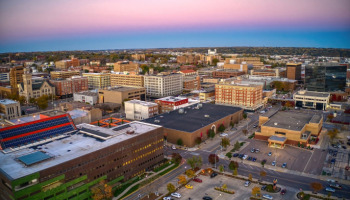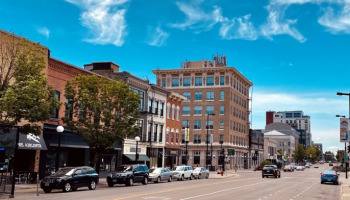Expert Insights
Binge drinking in the state of Iowa is above the national average, yet Iowa has done nothing to remedy their alcohol policy score. In fact, they come in as the third lowest state in our nation when it comes to enforcing strong alcohol policy safeguards. As a result, not only do one in five adults report binge drinking on a weekly basis, but so do college students. The normalization of consuming massive amounts of mind-altering intoxicants, is not only imperative for adults but also for the youth, who are the future of this state.
~ Lesley Wirth
How Much Does Drug Rehab Cost in Iowa?
Iowa is ranked 46th nationwide in terms of addiction treatment affordability, with an average cost of drug and alcohol rehab of $60,174 (without insurance).
- Medical detox is the most expensive, with an average cost of $148,351
- Long-term inpatient drug rehab in Iowa costs an average of $53,100
- Outpatient addiction treatment in Iowa costs an average of $8,823
- Outpatient methadone treatment is the most affordable, with an average cost of $7,839
The exact cost of addiction treatment in Iowa depends on several factors, including:
Types of care (outpatient or inpatient)
Amenities and features offered by treatment facilities
Duration of program (short-term, long-term, or detoxification)
Insurance provider coverage
Types of recovery support services
Location and size of facility (city or rural)
Low-Cost and Free Drug Rehab Centers in Iowa
Drug and alcohol rehab centers in Iowa vary from private (for-profit or non-profit) to government-funded (local, state, federal, and tribal). About 60% of substance use programs in Iowa receive public funds, which has helped make many low-cost and free options available across the state for people with no insurance or no income. These facilities usually require that potential patients validate their residence within the state, substance use status, and absence of insurance and income.3
Apart from choosing a government-funded facility, there are some other ways you can access affordable alcohol and drug use treatments, such as:3
- Obtaining a referral from the Substance Abuse and Mental Health Services Administration (SAMHSA)
- Finding a facility that offers affordable financing or payment options
- Choosing a sliding fee scale
- Applying for scholarships
As of 2024, there were over 190 drug rehab facilities across the state of Iowa. These facilities accept several payment methods. Of those treatment facilities, the following numbers reflect how many offer free or low-cost addiction treatment programs:
Does Insurance Cover Rehab Center Costs?
Though cash or self-payment is the most popular payment option, insurance can cover some or all of your costs, depending upon your provider.
Medicaid
Medicaid provides low-income adults, children, pregnant people, elderly adults, and people with disabilities with medical coverage. Medicaid is state-run under federal requirements. The program is funded in unison by states and the federal government.3
Medicare
Medicare is a federally funded program providing healthcare coverage to individuals who are older than 65, under 65, and receiving Social Security Disability Insurance (SSDI) for a certain amount of time, or under 65 and with end-stage renal disease (ESRD).3
Private Insurance
Popular private health insurance providers for Iowa are Aetna, Amerigroup, Beacon, Blue Cross Blue Shield/Wellmark, Cigna, ComPsyc, Iowa Total Care, Nebraska Total Care, Nebraska UnitedHealthcare – Community, Nebraska BCBS Anthem, Sanford Health, UnitedHealthcare – Optum, and Unity Point.2
How Does Iowa Compare in Alcohol and Drug Use?
A 2017-2018 survey on alcohol and drug use statistics showed that Iowa ranked:1
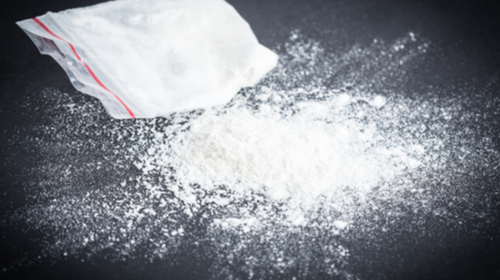
37th in yearly heroin use
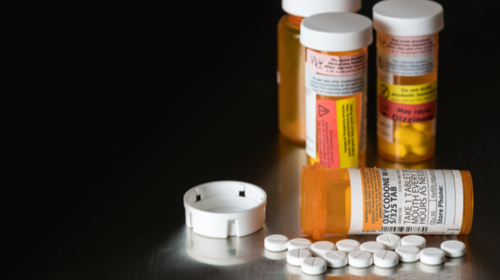
17th in yearly pain reliever misuse
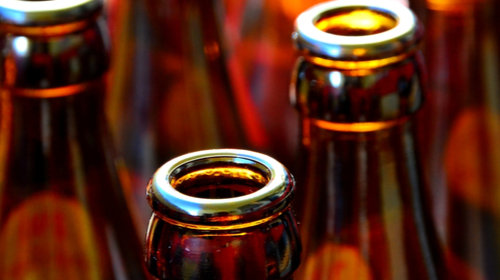
10th in past-year binge drinking
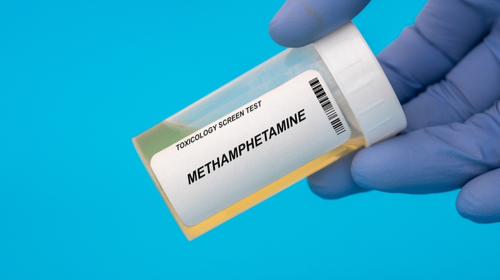
19th in past-year methamphetamine use
Drug and Alcohol Laws in Iowa
Iowa Good Samaritan Law: The Good Samaritan Law encourages witnesses (or overdose reporters) to a drug overdose to stay and call 911 instead of running out of fear of prosecution. Normally overdose reporters (making a good faith effort) “will not be arrested, charged or prosecuted for possession of a controlled substance, delivery of a controlled substance or possession of drug paraphernalia under the law.”5
Code of Iowa Chapter 321J.17: If you operate a motor vehicle while under the influence of alcohol and/or drugs, you are breaking the law. Iowa Code 321J outlines the sanctions that can be imposed on offenders. Anyone who offends in Iowa or an Iowa driver who offends in another state is required to complete a substance abuse evaluation to be performed by a state-licensed evaluator/facility.5
Americans With Disabilities Act (ADA): Substance use disorder, “including an addiction to opioids, is a disability under Section 504 of the Rehabilitation Act, the Americans with Disabilities Act, and Section 1557 of the Affordable Care Act, when drug addiction substantially limits a major life activity.”6
Residential Substance Use Disorder Treatment Act of 2021 – Section 1046: The Residential Substance Use Disorder Treatment (Act of 2021) expanded access to substance use care in jails and prisons and assisted individuals exiting correctional facilities to continue care in the community. The bill allows programs to adopt and use approved medication-assisted treatment and requires that staff be trained on the science of addiction. Programs are affiliated with providers who can administer medications for addiction care after incarceration and allow grantees to use funds to offer help during short periods of incarceration.7
How to Choose Addiction Treatment Settings
Medical Detox is often the first step in the recovery process. It is not a substitute for comprehensive substance abuse care—rather, it is a short-term intervention to help manage withdrawal symptoms, keep you safe and comfortable while substances leave your body, and prepare you for rehab.
Inpatient treatment utilizes an intensive curriculum to help patients delve into their substance use disorder and its effect on their personal life, family life, and professional life. You will live at the rehab facility and receive round-the-clock care.
Partial Hospitalization Programs (PHPs), also called day treatment, are the most intensive option, providing up to 30 hours of counseling per week in a hospital setting.
Intensive Outpatient Programs (IOPs) are a step down from PHPs, providing up to 20 hours of therapy per week. IOPs typically serve as a transition from PHPs to outpatient.
Standard Outpatient is the least intensive option, providing a few hours of care per week. This is best for someone with only a mild addiction and a strong support system.
Aftercare will allow you to receive ongoing support and relapse prevention services such as, support group meetings, individual therapy, group counseling, family therapy, step-down care, and sober-living homes.
Finding Specialized Drug Rehabs in Iowa
There are over 180 licensed and accredited alcohol and drug rehab centers in Iowa that are recognized by the Substance Abuse and Mental Health Services Administration (SAMHSA) and the Joint Commission. Many of them treat adolescents, young adults, adults, and older adults.3
Faith-Based
There are a select few faith-based addiction treatment centers in Iowa. These facilities integrate spiritual practices into their programs for those who want to prioritize their religious beliefs throughout recovery.
Dual Diagnosis
Many people with an addiction also have a co-occurring mental health disorder, such as bipolar disorder, depression, anxiety, or posttraumatic stress disorder (PTSD). Co-occurring disorders, commonly known as dual diagnosis, require comprehensive and integrated care that fully addresses the unique challenges of each disorder.4
Holistic
Holistic drug rehabs usually focus on the whole person, treating the mind and body simultaneously and offering techniques to address both the patient’s emotional and physical needs.
Luxury
Luxury residential facilities include upscale settings, more like a resort, and luxury features like spa therapy and massages.
Executive
Executive inpatient treatment centers often have luxury settings and are designed for high-powered professionals to continue working while recovering from an addiction.
What is Medication-Assisted Treatment?
Medication-assisted treatment (MAT) uses medicines, along with counseling and behavioral therapies, to provide a “whole-patient” approach to treating substance use disorders. The Food and Drug Administration (FDA) has authorized select medications to treat alcohol or opioid addiction. These medications alleviate the withdrawal symptoms and emotional cravings that trigger chemical imbalances in the body.4
Methadone is prescribed to treat opioid use disorder (OUD). It is one component of a complete treatment plan, which includes counseling and other behavioral health therapies to provide patients with a whole-person approach. It’s a long-acting, full opioid agonist and is classified as a schedule II-controlled drug.
Suboxone (the brand name) is a drug combination of buprenorphine and naloxone used to treat opioid addiction. Buprenorphine is a partial opioid agonist, while naloxone is an opioid antagonist that binds to opioid receptors and reverses/blocks the effects of other opioids (i.e., heroin, morphine, and oxycodone).
Naltrexone, which is prescribed to treat alcohol and opioid addiction, is an opioid antagonist that blocks the rewarding effects of alcohol and opioids, allowing people to more easily quit. The tablet form is used to treat AUD, while the extended-release injectable is often used for OUD.
Antabuse (disulfiram) is used to help battle your alcohol addiction. Antabuse is not a cure, but it will discourage you from drinking because of the unpleasant effects it causes if you mix it with alcohol. Antabuse, which is available in tablet form and taken daily, is dispensed by prescription only.
Acamprosate is used for those combating alcohol use disorder. Normally, acamprosate administration will begin on day five post-no alcohol, attaining full effectiveness in 5 to 8 days. It is offered in tablet form to be taken three times per day at the same time.
Should You Travel for Drug and Alcohol Rehab in Iowa?
 There are many options for alcohol and drug rehab centers in Iowa. Reasons for considering attending a rehab outside of your immediate home area include:2
There are many options for alcohol and drug rehab centers in Iowa. Reasons for considering attending a rehab outside of your immediate home area include:2
- You prefer the area in Iowa
- You have family or social support in Iowa
- You want a change of scenery
- You like the features, amenities, and approach of an Iowa facility or detox center
- There are no quality treatment centers in your area
Resources
- Governor’s Office of Drug Control Policy. (2021). Drug Trends in Iowa Evolving Health, Safety & Response Issues.
- FindTreatment.gov. (n.d.). FindTreatment.gov.
- Iowa Department of Public Health. (2022). Your Life Iowa.
- Substance Abuse and Mental Health Services Administration, Center for Behavioral Health Statistics and Quality. (2019). National Survey of Drug Use and Health
- Substance Abuse and Mental Health Services Administration. (2022, March 4). MAT Medications, Counseling, and Related Conditions.
- The Iowa Legislature. (2018). Iowa Code Section 124.418 – Good Samaritan Law.
- U.S. Department of Health and Human Services. (2018, October 25). Fact Sheet: Drug Addiction and Federal Disability Rights Law.
- US Congress – 117th. (2021). 1046 – Residential Substance Use Disorder Treatment Act of 2021.





